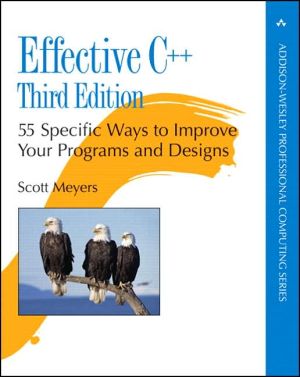

 |

|

The average rating for Effective C++: 55 Specific Ways to Improve Your Programs and Designs based on 2 reviews is 4.5 stars.
Review # 1 was written on 2019-10-02 00:00:00 Deborah Mctiernan Deborah MctiernanEasy to follow book. Very CLEAR explanations without a bunch of fluff. Great answers to the whys that you ask when designing software. |
Review # 2 was written on 2015-04-10 00:00:00 Lisa Pasqu Lisa PasquI have owned this book for several years and typically re-read it about every year or so. To say that a book is necessary reading is sometimes hyperbolic, but if you want to understand C++ then it is the simple truth in this case. Meyers has written three books on C++ - this volume, "More Effective C++" and "Effective STL". You, fellow programmer, need them all. Plus "Design Patterns", of course. Stroustrup and the ACR probably belong beside them, but Meyers is uniquely readable - easily the best author in the ill-specified and degenerate language we refer to as "English" among all those writing about real languages spoken by real hardware. He's even funny, despite writing in a genre whose adherents usually require humour explained with diagrams. As the other books are more advanced and/or more impenetrable, this book should be the first one you read. Some C++ experts will disagree with me here, as you do need to know the basics to get the best out of this book, and they will point to Stroustrup. I have a copy of that, but I would not describe it as learning material; it is reference material. You can actually read Meyers for pleasure and for learning, and that's an unusual combination in our cloistered and obsessive developers' world. Meyers will help you get the best out of C++. If you can write classes in Java or, God forbid, Visual Basic, then you can certainly write them in C++ and come up with a working piece of software. That is not the same as using the language effectively. C++ is a work of beauty, but it has many pitfalls and it requires some depth of knowledge to get the best out of it. It's also portable, and Meyers knows how to write portable code, which must surely be a consideration with Linux and Apple advancing into the market. All genuine C++ compilers comply with an ISO/ANSI standard, which in theory means that properly-designed C++ code will compile on any conformant compiler and can be ported to any chipset for which a compiler exists. In practice, of course, this is not quite so easy. Meyers is very familiar with the standard and has been involved in its evolution, which along with his experience of developing in C++ positions him perfectly to point out where portability can and cannot be taken for granted. The book is divided into 55 items, any of which will do you nicely for the train-journey to work. It is divided into "Shifting from C to C++", "Memory Management","Constructors, Destructors and Assignment Operators" , "Classes and Functions: Design and Declaration", "Classes and Functions: Implementation", "Inheritance and Object-Oriented Design" and "Miscellany". This covers a lot of ground, but for my money the material on operators and that on object-oriented design are the best value. User-defined operators are the kind of thing that has C++ developers hugging themselves for joy at the sheer coolness of the language, while object-oriented design is a set of concepts that are to some extent framed by the language - you need to know what they "mean" in C++ in order to see what you can do with the language. In general, Meyers will have you writing classes that are smaller, express their purpose more clearly and are less prone to generate impenetrable bugs at run-time, all of which are worthy design goals. Do it right and your errors will come up at compile or at link time (Item 46), and this is a good thing; let the compiler and the strong typing do your debugging before the bugs ever run. Required reading. I mean it! See also list: More Effective C++: 35 New Ways to Improve Your Programs and Designs Effective STL: 50 Specific Ways to Improve Your Use of the Standard Template Library Design Patterns: Elements of Reusable Object-Oriented Software Comment |
CAN'T FIND WHAT YOU'RE LOOKING FOR? CLICK HERE!!!